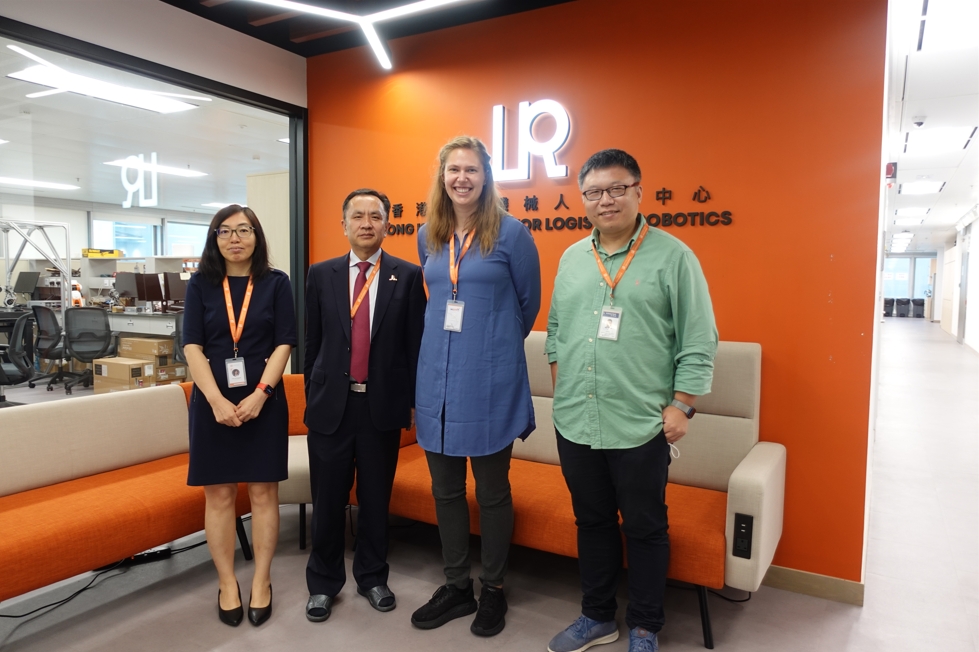The application of intelligent robot hands keeps making great strides and can now meet the needs of complex scenarios including assembly, pick-and-place and load carrying. Recently, Hannah Stuart, Assistant Professor of the Department of Mechanical Engineering at the University of California, Berkeley (UCB), who is well versed in the design of intelligent robot hands and grippers, visited Hong Kong Centre for Logistics Robotics (HKCLR). We had the pleasure of inviting Professor Stuart to share with us her research topics, cross-team work experience, advice for young scholars and her experience in Hong Kong.

Hardware design is essential
Professor Stuart's main research area is the design of intelligent robot hands, that is, researching on how they can better design more flexible and intelligent hands for robotic systems. Humans can manipulate objects with ease, but it is not always the case with robots. Enabling robots with a more capable sense of touch is the significance of Professor Stuart's research topic.
A lot of people focus on machine learning and algorithms when studying robot manipulation. Professor Stuart pointed out that hardware design is also essential in robotics research and the design of the manipulator needs to complement various new algorithms and different control functions. Many grippers and touch sensors are driven by algorithms, requiring the understanding of physical interaction. Therefore, the coupling between the physical manipulator and the robot autonomy is crucial.
Professor Stuart's specialty in the HKCLR involves tactile perception. People have a very rich sense of touch, and her team is working to give robots similar capabilities. They have developed smart skins and suction cups to give robot end-effectors the sense of touch. As they explore the use of new electronic materials, Professor Stuart's team is collaborating with Professor Dongyan Xu's team at the Chinese University of Hong Kong. Professor Xu's team is responsible for designing force and temperature sensitive materials for future integration into robot hands. These two teams work on enabling robot hands to have a sense of touch through different entry points of electromechanical hardware design.
Efficient and collaborative cross-team cooperation
Professor Stuart's team works synergistically with HKCLR, and both parties have established a very good working relationship, with efficient communication and active sharing, mainly through Zoom plus multiple in-person visits to both Hong Kong and California and meetings at international conferences. Because Professor Stuart's research field is about sense of touch, it benefits from close manual observation and feeling to understand various electromechanical devices. She also greatly enjoys having in-depth face-to-face communication with different people. For example, during one of Professor Stuart's visits at HKCLR, Professor Xu's students showed their latest progress in the development of tactile sensors. Professor Stuart was very excited about this, noting that the collaboration with HKCLR allows their team to take a global perspective and see things from more diverse angles.
Professor Stuart is also inspired by the close communication between Hong Kong’s innovative technology and the industrial field, as such cross-border cooperation is highly beneficial to motivate globally relevant innovation.
Professor Stuart has especially enjoyed learning about the industrial applications explored by Professors Fei Chen and Darwin Lau through the HKCLR. In fact, she recently published a co-authored collaborative paper alongside Professor Chen on the use of her smart suction cup tactile sensing technology for electronics recycling applications. This concept was motivated by the efforts of SOTA Robotics (HK) Limited, a company specializing in smart recycling, and is important to improve sustainability and efficiency in logistics applications. This paper is accepted to the 2024 IEEE International Conference on Robotics and Automation and will be presented internationally this year.
Innovating with passion and resilience
People do their best work when they have an honest passion. Professor Stuart pointed out that there is a lot of creativity and teamwork when it comes to robotics design. Like creating art, people need to think outside of the box and maybe break assumptions to find new solutions. By looking at a problem from a variety of perspectives, one can break with tradition and find solutions that make a difference to the community at large. Therefore, she hopes that more people will consider bringing their unique passions to the field of robot design, whether they fit the image of a stereotypical roboticist or not.
Especially for students who do not fit the stereotypical mold, there are bound to be difficulties along the way. Professor Stuart recommends that we try to identify our own strengths and keep going. There is no need to be afraid to put in the extra effort to find a direction that suits us. We may find different perspectives and come up with different points of view on the path. Professor Stuart also mentioned that encouragement and recognition can make a big difference, and having the support of friends and the team can also boost confidence.
Feel the warmth and beauty in Hong Kong
Professor Stuart first visited Hong Kong in 2013, when she mainly toured the business district, and felt that Hong Kong was like a city of the future. As she collaborated with The Chinese University of Hong Kong, she has also enjoyed the beautiful mountainous landscapes, and the Hong Kong Science and Technology Parks’ modern facilities.
Hong Kong Science and Technology Parks, in which HKCLR is located, has gathered many start-ups and is well-developed. Professor Stuart discussed her experiences in Silicon Valley in the Bay Area. Silicon Valley has a strong start-up culture, where industrialization of academic achievements is encouraged, and organizations such as the National Science Foundation are very supportive of young scholars and entrepreneurs. UCB also has a similar incubation platform for campus start-ups called Berkley SkyDeck.
During her visit to Hong Kong, Professor Stuart was warmly assisted with a sense of friendliness and goodwill. Her students have similarly come to HKCLR and greatly enjoyed meeting and working with the researchers here. We believe that the cooperation between UCB and HKCLR will become closer in the future.